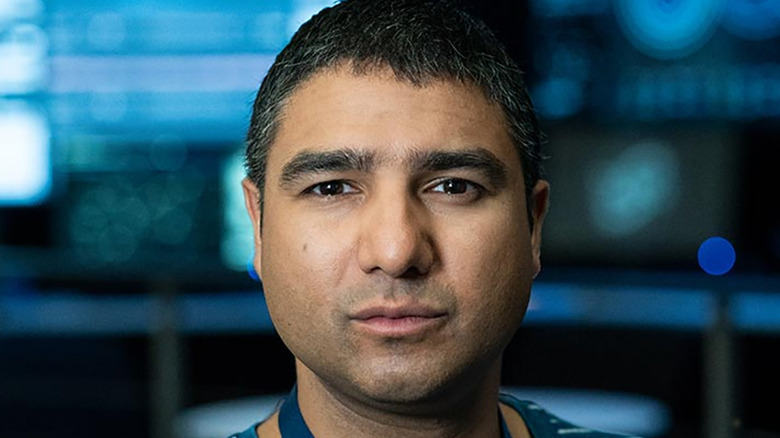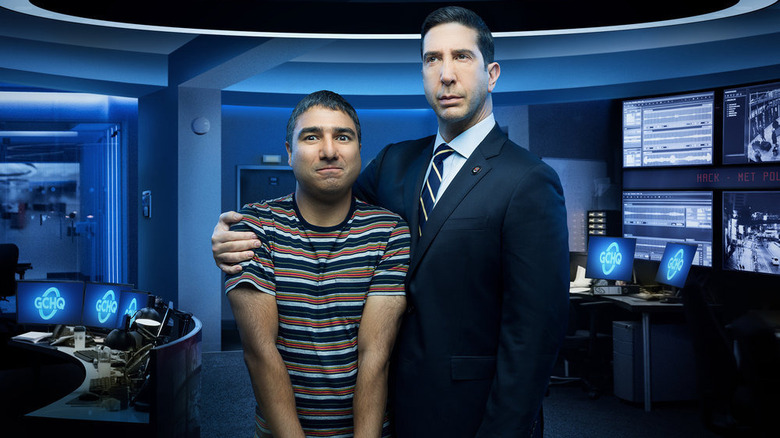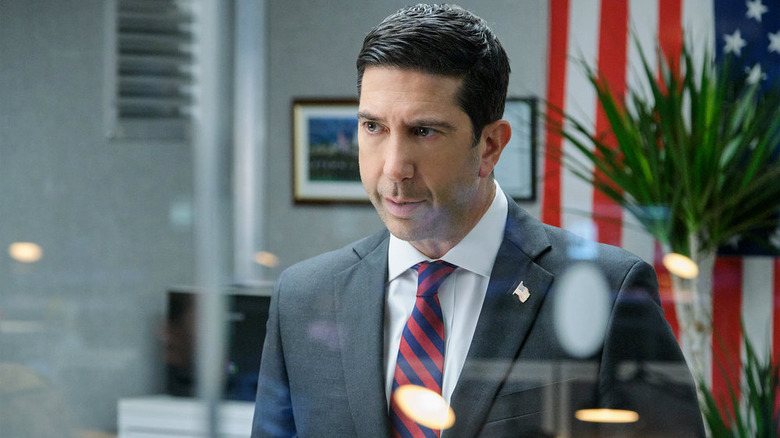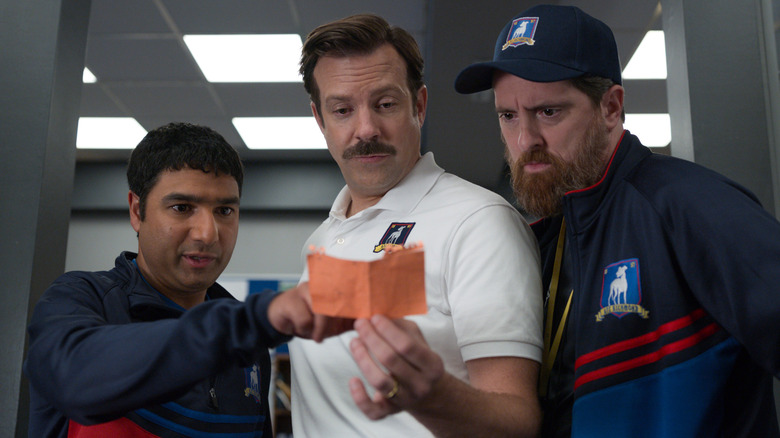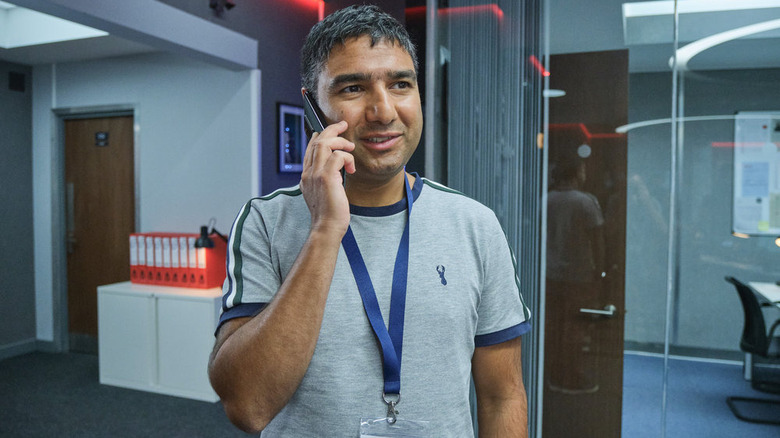Nick Mohammed Compares Ted Lasso To His New Comedy Intelligence - Exclusive Interview
Chances are, you know Nick Mohammed from Apple's hit feel-good comedy "Ted Lasso," on which he plays AFC Richmond's overlooked equipment manager, Nate "The Great" Shelley. It's a great performance, but as far as Mohammed's talents are concerned, it's only the tip of the iceberg. Mohammed is a regular at the Edenborough Fringe Festival, and can often be found on British TV as his loudmouthed alter-ego Mr. Swallow. He's created and starred in a number of comedy programs for BBC Radio, and has appeared in the likes of 2018's "Christopher Robin," where he voiced Piglet, "Bridget Jones' Baby," and "Drunk History."
And then there's "Intelligence." Created by Mohammed, "Intelligence" stars "Friends" veteran David Schwimmer as Jerry Bernstein, an ego-driven, manipulative NSA agent who ends up serving as liaison to the UK's Government Communications Headquarters' top cyber crimes unit. In addition to running the show and writing every episode, Mohammed also plays the other co-lead, Joseph Harries, an inept analyst who's both cheerily optimistic and completely unqualified for his job.
"Ted Lasso" fans will immediately see some similarities between Joseph and Nate, although the differences stack up quickly as both shows go on. Same goes for the premise: While both series tell stories about Americans who've traveled over the pond, they have fairly unique tones and sensibilities. Honestly, that's probably for the best. "Intelligence" is its own, hilarious thing. If you enjoy Mohammed's performance on "Ted Lasso," it's well worth checking out.
How Nick Mohammed made cybersecurity hilarious
So, what made you decide to make a comedy about cybersecurity, which is not necessarily an inherently funny topic?
Yeah, you're right, it's not inherently funny, but I think what drew me to the idea were these characters who are a bunch of misfits are working in a place where the stakes are actually really, really high. The backdrop of national security, and I guess cybersecurity, cybercrime, it's the new frontier of that kind of intelligence fighting, and it just felt like a particularly funny base note to have the huge stakes of national security set against this odd bunch of characters. They can't even have normal social interactions, let alone be able to save the world and prevent all that stuff from happening.
"Intelligence" isn't afraid to play with real topics, and it's not afraid to go very dark. EternalBlue, the basis of season two, is a real thing. You have a comedic waterboarding scene. Were there any jokes that you had to cut because you were worried about going too far?
Well, I share the scripts really early on with the producers, and David is a huge collaborator on the show. There's a slight element of the wisdom of the crowd. Season 2, episode 4 is the anti-harassment workshop, where we tackle race and sexual harassment and so on, and you don't want to be looking as if you're condoning certain behaviors, so you do have to be careful. It is right to really scrutinize your scripts in that way.
And we have a great director, Matt Lipsey, who would often allow us to shoot alternatives if we did think, "Maybe this is crossing the line." You want to take it right up to the line, because that makes it quite eye-opening and, if you can shine a light on those topics whilst making people laugh, that is quite a useful thing to do. What you never want to do is overstep that mark, or to make it feel gratuitous or just done for the sake of it. Occasionally, we would film alternatives and then we would make that decision in the edit, and allow our cast to weigh in as well. We would never make someone feel uncomfortable about something that they were saying.
I think what helps, to a degree, is that "Intelligence" is such a silly show. It's almost a cartoon. We're clearly not taking ourselves very seriously. For example, when Jerry, David's character, says sometimes the most obnoxious, horrendous things, we know that the joke is absolutely on him, because he is the biggest fool in the room.
What it's like to work with David Schwimmer
David Schwimmer was attached to "Intelligence" really early on, right?
Yeah, we had met doing some improv stuff on a previous pilot that I had co-written, and we did quite a lot of improv on that. David and I really enjoyed playing the dynamic where he was quite alpha and brash and I was quite shy and British, and that formed the basis of that Jerry-Joseph dynamic.
What strengths of his did you want to play on when you were creating the character? I guess, to put it another way, why is Jerry a part that only David Schwimmer could play?
Once the show got the series green-light, it would've been absolutely daft not to lean into how good he is at physical humor. In fact, there was probably even more silliness that I put in than made it to the final cut, because sometimes it was just too much. But he is so good at that kind of proper clowning around, the old-school stuff.
I was always trying to think, in every scene, "Is there a funny physical thing that David could do during this?" And sometimes it would just happen organically. I just watched an episode from Season 2 the other night and there's a bit where the camera's not really on him, but he's just eating an apple in the background. He eats an apple and then spits a bit of it out as if he's never tried an apple before, and it's this tiny thing. I can't remember if it was scripted or not. It might have been, but I don't want to take merit for that if David just improvised it. But he's so quick. He's so great in the spur of the moment. He always goes above and beyond.
I also loved that he's so well known for playing Ross and, obviously, you can't help but empathize with him. He almost always has that look behind his eyes, that presents itself in Ross. I just loved writing the antithesis of Ross and making him swear, making him really brash, making him really quite right-wing, basically. It was really fun to play into all of the things that aren't Ross about his character in this. It was great to just dial those up to 100 and then, occasionally, pull back if it felt like we were going too far. But, yeah, that was really fun.
Why Mohammed is just fine sticking to acting on Ted Lasso
Between "Intelligence" and "Ted Lasso," you're on two shows now that are both fish-out-of-water comedies about Americans who travel to England. But one was made by American creators, and one was made by British creators. How do you feel like different cultural backgrounds inform the direction and tone of those two shows, which have a similar premise, but go in very different directions?
I guess one thing to say about "Ted Lasso" is that it's a writers' room and we have least two, if not three, British writers on that show. But, yeah, it is a largely American show. I think it's funny because, from the point of view of writing "Intelligence," there were times when I was writing Season 1 and playing with the culture clash between America and British and I would think, "Oh, is this a little bit obvious? Am I writing a little bit of a trope of a character in Jerry?"
And then I realized quite early on, that at the time of writing, Donald Trump was the president of the United States. No one was a bigger caricature for saying vulgar, brash, unpredictable, casually misogynist, xenophobic statements than he was, and he was the ruler of the free world. I was like, "Well, you can't really parody this, and so I'm going to keep on writing Jerry as I see fit."
And, listen, they're tonally incredibly different shows. I think "Ted Lasso" initially played with the culture clash, when Ted and Rebecca in particular are pitted against each other, but I think it quickly becomes obvious that Rebecca actually isn't really the antagonist in that show, and the personality clashes and the culture clashes start to dissolve. Whereas, I think, in "Intelligence," we're constantly poking fun at Jerry's ignorance and him just thinking that he could walk to London, even though it's 100 miles away from Cheltenham or whatever.
They're tonally very different. We're allowed to be a lot sillier than "Ted Lasso" is. But, yeah, it's funny, isn't it, that they both came about at a similar time? And I very much just auditioned for "Ted Lasso." There was no design on my part to seek out another show that features an American coming over into a British institution.
Given your writing background, do you have much input into Nate's character on "Ted Lasso?"
No. I filmed "Intelligence" and then I went on to "Ted Lasso." We've just finished filming season two of "Ted Lasso," and there is something very refreshing about being able to then go into a job where all you have to do is act. You don't have to worry about any of the writing, any of the edit, any of the promotion. And it is, it genuinely is, quite nice to wear that hat for a bit and not worry about anything else.
They're so collaborative in their spirit and, of course, Jason and Brendan, in particular, come from such a heavy improv background. Occasionally, we'll do a slightly looser pass on scenes. If you chip in something different and they want to run with it, then they absolutely do, but on the whole, I try and do what I'm told because I find that quite refreshing. Whereas, in "Intelligence," I'm scrutinizing every word that everyone's saying and looking to see if we want to rewrite certain scenes, so it's quite nice to not have to do that on another show.
How Mohammed's time on Ted Lasso made Intelligence a better show
You wrote Season 2 of "Intelligence" after wrapping "Ted Lasso" Season 1. Were there any specific lessons you learned working on "Ted" that informed this new season?
Not in terms of the content, just because, I think, tonally, they're very different. On "Intelligence," it was such a convivial atmosphere anyway. Everyone felt that they could chip in and it was always a lovely set, and it's a small group of people. "Ted Lasso" is a bit of a bigger outfit. But, oh, gosh, you could not help but be infected by Jason — so much of Jason is in Ted — and Jason's optimism and genuine hope and his humility. That kind of attitude is so great and, when it comes right from the top like that, it is such an honor to be in that show. You really felt so valued and so warm.
And I just remember thinking, just as a producer of a show, a showrunner on "Intelligence," if I've learned anything, it's how to run a show and try and lead by example. Not that I felt like I was massively failing in that before, but when you see someone doing it at Jason's level, it really makes you sit up and think, "This is the way things should be done, and how people should be treated." It was wonderful. Yeah, I'm really proud of both "Ted" and "Intelligence" for being really good and fun and having high-spirited atmospheres on set.
In addition to your comedy work, you're also a very accomplished magician. Is there anything that you've learned from performing magic that you've been able to apply to your comedy and television careers?
Oh, that's an interesting one. Yeah. I started off doing magic when I was quite young and worked as a magician professionally for a while before comedy and acting took over.
There's a lot about comedy that is far more difficult than magic. That was definitely one takeaway. Not that I would [do this] necessarily, but it's quite possible to buy a magic trick off the internet and be performing it as soon as it arrives. You can perform it and you can get a reaction from a paid gig, like a wedding, because the trick has worked. A lot of the time, if you're hired as a magician, it's about the trick working and less about the personality and the authenticity of the performer performing that trick, right?
Whereas, in comedy, and in anything that is an authored piece of writing, there's just far more work that is put into it because you can't just suddenly create a script as quickly as you could open up a magic trick, read the instructions. "Oh, yeah, I've just got to flick that little thing on the back of a playing card." Basically, it's self-working. There's no real analogy for that in terms of scripts unless you just plagiarize something, I guess. And so, writing and performing comedy is more difficult because you have to inject a lot more personality into it.
I think, on the whole, it's a better art form for it. It feels like you could pick lots of different comedians who could only perform their own type of comedy because the type of comedy they do becomes a particular brand. Whereas, I think, the magic, there are a few brilliant magicians who have absolutely owned their particular type of magic, but there are thousands upon thousands of working magicians who are doing close-up and so on in hotels who are effectively just performing the material. They aren't really injecting anything of themselves into it, and I think it's, sadly, not the better for it.
Not to slag off magic and magicians, but I think comedy is a lot harder. It's a lot harder to generate a laugh out of someone than it is to make someone think, "Oh, wow, I don't know how that works." But I think magic is quite short-lived in that respect, whereas good comedy can last longer with an audience member.
Season 2 of "Intelligence" is now available to stream on Peacock.
